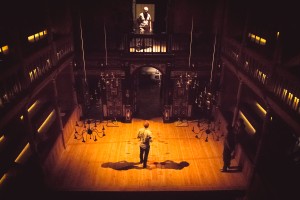There’s nothing either good or bad but thinking makes it so. Someone once said.
Holger Schott Syme doesn’t like OP. In fact he micturates vinaigre over the whole concept. It’s uncertain from his blog post if he’s ever seen any. Holger is an Early Modern Scholar and I personally respect his work. He’s also a big fan of the Deutsche Buhne i.e. the German stage and theatre and bemoans the fact that other countries don’t invest as much in theatre as they do. Hear, hear.
Of course I can now fill this blog post with my reply to his whilst it is under moderation. But the reply has been approved and DC has chimed in with his response and a dialogue is building.
Did you see the latest OP production at the SWP? Have you ever seen an OP production? Are you annoyed that the Globe and its staging of OP productions has taken precedence over your attempts in theatrical historiography? How long since you took a voice class to discover different nuances within your own registers?
Where’s your sense of discovery Holger? It’s all a bit; ‘been there, done that’ sounding.
I quite agree that OP will never re-create the conditions of an Elizabethan actor for ALL the reasons you stated. Be it the Queen’s men or the Globe’s. Linguistic and spatial essentialism are new to me, though they seem to confine monarchical concepts in a tiny room.
Your post smacks of reductionism across the different fields. In acting you deny the voice of response to the practice. In directing you belittle the pretenders that dare to bring that which never was. In practice you squeeze any form of discovery into a faulty template for past causality.
And yet the essential aspect of Original Practice is simply theatrical exploration. Original Pronunciation offers a sound system approximating Early Modern English. This sound system united a disparate group of actors with very different regional and national accents. It was a very exciting and visceral experience for those of us who took part because of that alterity.
But hey maybe we’re all fooling ourselves right? The exigencies of theatrical practice in Elizabethan times were dictated by the societal conditions. The fact that actors used cue-scripts had no effect on the writers who knew they did because time, money, lack of paper is the over-riding factor here. Those writers never married their instruction of character into such a part, which then tied back into the whole.
The idea of OP isn’t fixed. There are no rules to go by. Otherwise Renaissance Fairs would have done this work years ago. What we explored was how to create an ensemble working within the strictures of cue-script and the new-old accent of OP to see what the results would be. Those results surprised us and the audience. And in the Q&A afterwards objections like your own were addressed. However that does not negate the experience no matter how much you may pooh-pooh it.
Ahistorical nonsense or no. You are the one claiming equivalence. As a practitioner my feet are firmly planted on that stage giving the best damn performance i can under the conditions that present themselves that night in that place and time. And the next night whether those conditions of place and type of venue have changed or not. Proscenium arch, or thrust, or living room, or bar, or wherever it be. Actors don’t get to choose too often the concepts that are forced on them. And the amount of rubbish I’ve heard about RP and Shakespeare, willst du nicht wissen. I’m not in any kind of denial about OP, or RP, oder Buhne-Sprache. Bring back the repertory system if we can.
But deny OP? Deny the world of theatre. And box it to be poked at and compartmentalised and scorned. You are not alone Holger. Many scholars think the way you do. Let’s hope the actors and directors don’t.
There are other slightly dissenting voices from those who actually experienced it, like Eoin Price here and Lady M here. And the twittysphere responded too.
So OP attracts attention and the scholars and theatre world need to deal with it. Because we the practitioners are going to keep on doing it. And if we can do it in theatres like the Sam Wanamaker Playhouse that’s just schweet!
The comment I posted was replied to by Holger Schott Syme on his rather excellent blog.
And commendably DC carries on the dialogue without descending into ad hominems as We are wont to do.


[…] post OP reviewed…Good and bad. appeared first on I Love […]
[…] post OP reviewed…Good and bad. appeared first on I Love […]
[…] OP reviewed…Good and bad. […]